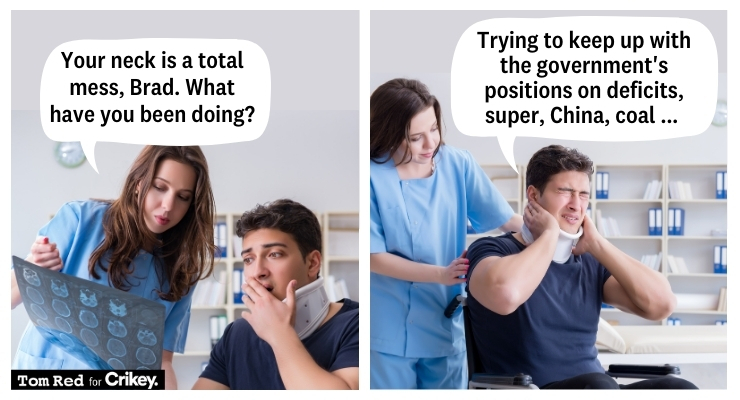
It must make the job of governing so much easier when you can do so without a substantial proportion of the journalists who are paid to report on you ever pointing out your inconsistencies.
In recent days — courtesy of the axeing of Victoria’s ill-advised Belt and Road deal with the Chinese regime, fervent speculation about the chances of military conflict with China, the umpteenth reannouncement of the expansion of military facilities in northern Australia, and Mike Pezzullo’s unsubtle declaration that He Will Return to the Defence Department — we’ve yet again been reminded of the tense, and increasingly so, state of relations with China.
Unmentioned was that six years ago, the government was tripping over itself cosy up to the regime of Xi Jinping, complete with allowing that murderous dictator to defile Australian Parliament with a speech, Tony Abbott lauding Xi’s commitment to a democratic China (yes, Abbott actually said this), and a trade deal. Anyone who objected to that deal was, according to Tony Abbott and his media cheerleaders, racist.
The deal itself turned out to be a dud and is rarely mentioned — China ignored it to punish a wide range of Australian industries last year. But the Abbott government knew it was a dud deal ahead of time, even by the low standards of its so-called “free trade agreements”. A panicked Abbott — his prime ministership already floundering by that stage — needed a big economic announcement in 2015 and was happy to take whatever China was offering.
Abbott these days is a hawk urging us to stand up to Xi, who –surprise! — turns out not to be committed to a democratic China at all. Abbott explains his complete reversal by saying in The Australian “just five years ago, most of us were China optimists. We thought that economic freedom would eventually lead to political liberalisation too”.
And that’s the broader Coalition narrative, too — that Xi has unmasked himself as a Bond-style villain in recent years when we thought he was a nice guy before that. As if China’s systemic, industrial-scale human rights abuses, aggression in the South China Sea, mass murder and brutal suppression of Uyghurs in Xinjiang weren’t readily apparent before 2017.
Still, that lame line is good enough for most of the media, which rarely bothers to mention the complete reversal of the Coalition’s attitude to China. But there’s a bigger consistency at play here — that China is being used entirely for partisan political gain, and consistency is not merely the hobgoblin of little minds but an irrelevant hurdle to political attack.
Much like the way deficit spending to support employment is a matter of partisanship. When Wayne Swan abandoned Labor’s return to surplus in December 2012 in the name of supporting growth and jobs, unemployment was 5.4%. Naturally the Coalition gave him and Julia Gillard hell. This week Josh Frydenberg abandoned his own self-imposed rule to start returning to surplus when unemployment was well below 6%. The current unemployment rate? 5.6%.
As Kevin Rudd noted, there were no “Debt Bomb” headlines from the government’s media outlets — quite the opposite. Frydenberg made the right call. But so did Swan.
Another reversal of course garnered less attention: Financial Services Minister Jane Hume was forced to abandon yet another attack (by our count, the 2759th) on the Liberals’ bogeyman, industry super. She’d planned to impose a benchmarking test on super funds to weed out “underperformers”, but skewed the test in favour of retail super funds by basing it on net investment returns, not net returns to members — which you’d think would be the basis for any benchmarking — so that the higher administration fees charged by retail funds would be excluded.
It was so transparently biased that Hume this week was forced to backflip and include administration fees. Again, the government’s media outlets were on hand, not to jeer at the policy reversal but to explain how wonderful it was; an “exclusive” in The Australian explained it was about “the government moving on administration fees to remove the temptation of funds to game the performance test by shifting costs to fees”. Author Geoff Chambers was apparently unaware retail funds have already done a pretty dandy job bulking up fees. Including for dead people.
But Hume is used to doing backflips — she was recently forced to abandon her plan for domestic violence victims to raid their own super (shortly before, hilariously, being given the portfolio of “women’s economic security”).
It’s not stating a profound truth that governments behave in partisan ways, or are inconsistent. Nor to observe that the media and particularly News Corp give preferential and inconsistent treatment to government decisions based on which side is in power. But this is a government that is prepared to act inconsistently and play politics with the most important issues facing Australia: our relationship with our biggest trading partner; the jobs of hundreds of thousands of Australians, or their retirement incomes.
And that’s without even mentioning climate action, where the media praises Morrison for inching toward a 2050 net zero target that Labor was demonised by the Coalition and the media for embracing.
Governing is so much easier when you’re never held to account for complete reversals of policy.








Crikey is committed to hosting lively discussions. Help us keep the conversation useful, interesting and welcoming. We aim to publish comments quickly in the interest of promoting robust conversation, but we’re a small team and we deploy filters to protect against legal risk. Occasionally your comment may be held up while we review, but we’re working as fast as we can to keep the conversation rolling.
The Crikey comment section is members-only content. Please subscribe to leave a comment.
The Crikey comment section is members-only content. Please login to leave a comment.